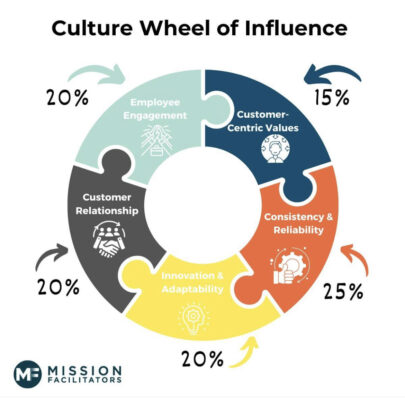A company’s culture plays a vital role in shaping its overall customer service experience. Today’s consumers are shrewd. They can tell if the service they are getting is “phoned in” and just part of a company’s standard operating procedure.
They can’t help but roll their eyes or tune out when they hear “our Delta family is delighted to have you on board” coming from a bored, monotoned cabin attendant. The values, beliefs, and behaviors that define a company’s culture directly impact how employees interact with customers, handle their inquiries, and ultimately influence customer satisfaction and loyalty. Here’s how, so you know how you can improve both within your organization.

Employee Engagement and Empowerment
A strong customer service culture begins with engaged and empowered employees. When a company’s culture fosters an environment of trust, respect, and open communication, employees feel valued and motivated to go the extra mile to meet customer needs. A positive culture encourages employees to take ownership of customer interactions, leading to personalized and empathetic service. On the other hand, a toxic or disengaged culture can breed apathy and indifference among employees, resulting in poor customer experiences.
Customer-Centric Values
A customer-centric culture places the customer at the center of the organization’s mission and values. When a company emphasizes the importance of understanding and meeting customer needs, this mindset permeates throughout all levels of the organization. From the top -down, a customer-focused culture encourages employees to prioritize customer satisfaction and constantly seek ways to improve the customer experience. This alignment of values ensures that customer service becomes an integral part of the company’s DNA.
Consistency and Reliability
A company’s culture sets the tone for consistency and reliability in customer service delivery. When a culture of excellence and accountability is cultivated, customers can expect a high level of service across various touchpoints. This includes timely responses, accurate information, and reliable solutions. A culture that values consistency helps build trust and confidence in the company’s ability to meet customer expectations regularly and consistently.
Innovation and Adaptability:
A culture that encourages innovation and adaptability can positively impact customer service. Companies that foster a culture of continuous improvement and experimentation are more likely to identify new ways to enhance the customer experience. They are also better equipped to adapt to changing customer needs and market trends. A culture that values innovation empowers employees to think creatively and find unique solutions to customer challenges.
Employee-Customer Relationship:
A company’s culture heavily influences the relationship between employees and customers. When a company prioritizes building solid customer relationships, employees feel empowered to connect with customers on a deeper level. A culture encouraging empathy, active listening, and personalized interactions enables employees to build customer trust and loyalty. As a result, customers feel valued and appreciated, fostering long-term relationships with the company.
Here are two case studies that demonstrate this:
- Goodwill of Central and Northern Arizona learned the Phoenix community saw them as too corporate and blind to the needs of the less fortunate. In 2014, they hired Mission Facilitators to change community perception by working from the inside out, as they: Realized and recognized that the customer experience would improve when the company culture did improve. Over three years, we designed and led a culture -transformation that included strategic planning, monthly team events, and executive coaching and training. Engagement, productivity, retention, and customer survey scores all improved. Now Goodwill is a respected and authentic social services organization.
- A high-tech organization wanted to improve the customer experience. During several workshops, we taught coaching skills to salespeople to help improve the listening, trust, and feedback within the culture. A common reframe during those sessions was: How can you provide authentic customer service if you don’t experience that within your own company?” Since then, the company has made great strides in its culture and customer service.
“Because 71% of U.S. consumers are now aligning their spending with their values, businesses that practice in a new way will find a vibrant marketplace.”
– Strategy+Business Magazine, 2011
A Gallup employee survey reported a direct correlation between how valued employees feel, based on the organization’s mission, and employee retention. And according to Cvent, customers will stick around if employees do too. “Because 71% of U.S. consumers are now aligning their spending with their values, businesses that practice in a new way will find a vibrant marketplace.” – Strategy+Business Magazine, 2011
A company’s culture mirrors the customer experience. Consumers vote with their wallets. They detect bad customer service actors better than Hollywood casting directors. Conversely, the happy waiter sells more wine, the motivated technical support person creates customer loyalty, and the purpose-driven hotel manager inspires referrals.
In this post-covid, fake news, A.I. world, being authentic can feel abnormal is terrifying for us, but it’s a requirement we have for others. Good customer service takes courage because it requires us to be the product of our product by being authentic. For the company leader who wants to improve the customer experience, you’ll have the best possible results when you should start by improving the employee experience.

